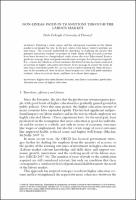Chapter Non-linear Paths in Transitions through the Labour Market
| dc.contributor.author | Federighi, Paolo | |
| dc.date.accessioned | 2022-06-01T12:09:13Z | |
| dc.date.available | 2022-06-01T12:09:13Z | |
| dc.date.issued | 2018 | |
| dc.identifier | ONIX_20220601_9788864536729_120 | |
| dc.identifier.issn | 2704-5781 | |
| dc.identifier.uri | https://library.oapen.org/handle/20.500.12657/55937 | |
| dc.description.abstract | Entering a study course and the subsequent transition to the labour market is no longer the rule. In the past, routes were linear, today transitions are non-linear. The research undertook to contribute to studying the factors that promote university students’ transition to work. Some of the research activities have been devoted to a longitudinal study where the ways Educational Science graduates manage their own professionalization strategies have been investigated. It is a cluster for which in several countries the lowest return has been estimated in relation to higher education investment. If we manage to clarify the terms of non-linear transitions paths we can succeed in understanding the types of measures to be introduced, how to relate them to processes that will professionalize students, when to activate them, and how to evaluate their impact | |
| dc.language | English | |
| dc.relation.ispartofseries | Studies on Adult Learning and Education | |
| dc.subject.other | higher education democratisation | |
| dc.subject.other | non-linear transitions | |
| dc.subject.other | professionalization measures in higher education | |
| dc.title | Chapter Non-linear Paths in Transitions through the Labour Market | |
| dc.type | chapter | |
| oapen.identifier.doi | 10.36253/978-88-6453-672-9.20 | |
| oapen.relation.isPublishedBy | bf65d21a-78e5-4ba2-983a-dbfa90962870 | |
| oapen.relation.isbn | 9788864536729 | |
| oapen.series.number | 8 | |
| oapen.pages | 17 | |
| oapen.place.publication | Florence |

